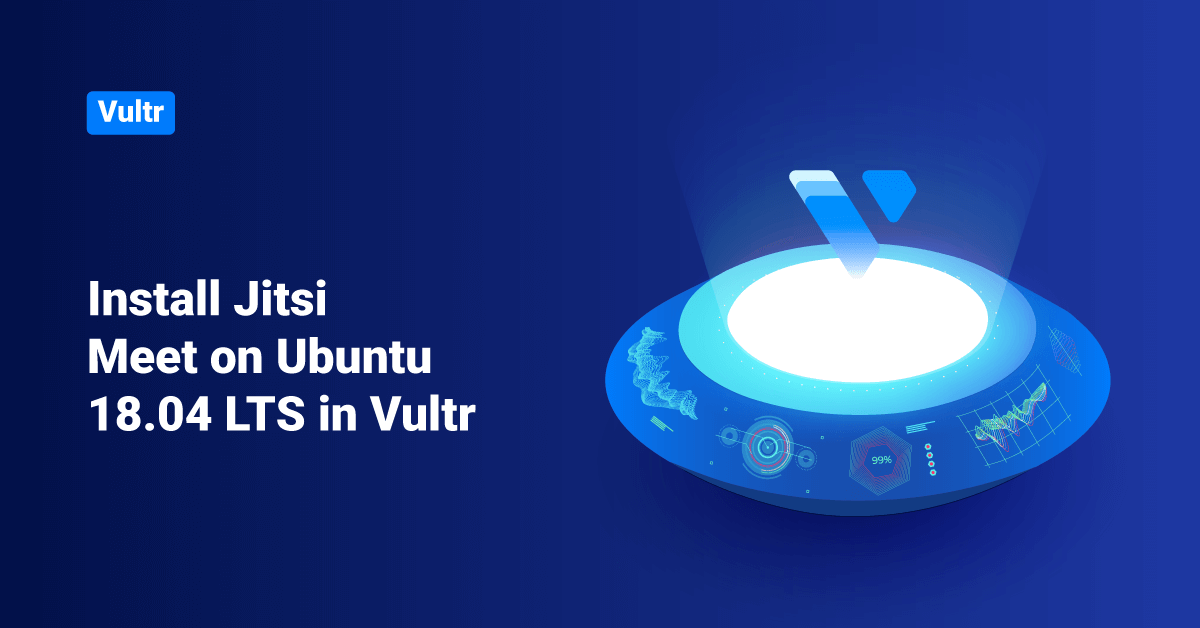Vultr offers cloud servers with elastic SSD storage for all their customers. It provides an advanced cloud platform to deliver hosting services and cloud infrastructure for businesses and developers. Vultr fascinates users with 100% SSD storage, One-click deployment, and fully automated and dedicated servers. Vultr also offers a user-friendly dashboard with a very reasonable price tag compared to its competitors. Vultr’s feature and the affordable price tag make it a trustworthy option for limited budget and small-scale ventures. Jitsi Meet is a free, open-source video conferencing service solution packed with various premium features, such as high-grade encryption and privacy, superior sound quality, and universal multi-platform availability. With the help of Jitsi Meet, users can easily set up a stunning video conferencing service of their own in their server. In this tutorial, we will learn the steps to install Jitsi Meet on Ubuntu 18.04 LTS in Vultr.
One-Click Jitsi Server
Vultr offers a pre-installed Jitsi server that is ready to launch at any time. Users can deploy a Jitsi Meet server in Vultr’s customer portal without installation steps. The One-Click Jitsi server supports the user’s custom domain name, a Let’s Encrypt SSL certificate, and it’s the most reliable way to install Jitsi.
Manual Installation of Jitsi Meet
To install a video conferencing service on an Ubuntu 18.04 LTS server instance using Jitsi Meet, follow the below steps:
Prerequisites:
- A fresh Vultr Ubuntu 18.04 LTS x64 server instance with an IPv4 address, such as 203.0.113.1.
- A user with sudo privileges.
- A domain jitsimeet.test.com pointed to the server instance mentioned above.
>> Note: When deploying on the user’s server instance, ensure to replace all test values with the user’s actual values.
Step 1: Set up a Swap Partition
For a system with 2 GB of memory, it is recommended to set up a 2 GB (2048 MB) swap partition to improve system performance. To set up a swap partition, execute the following commands:
$ sudo dd if=/dev/zero of=/swapfile count=2048 bs=1M $ sudo chmod 600 /swapfile $ sudo mkswap /swapfile $ sudo swapon /swapfile $ echo '/swapfile none swap sw 0 0' | sudo tee -a /etc/fstab $ free -m
>> Note: The swap partition size will vary if the user uses a different server size.
Step 2: Set up the Domain Name
Users need to correctly set up a hostname and an FQDN for the machine before enabling HTTPS security by deploying a Let’s Encrypt HTTPS certificate. Execute the following commands to set up a hostname, jitsimeet, and an FQDN, jitsimeet.test.com, for the Vultr system:
$ sudo hostnamectl set-hostname jitsimeet $ sudo sed -i 's/^127.0.1.1.*$/127.0.1.1 jitsimeet.test.com jitsimeet/g' /etc/hosts
Execute either one of the following commands to confirm the domain name set up results.
$ hostname $ hostname -f
Step 3: Set up the Firewall Rules
As suggested by Jitsi Meet, users need to allow HTTP, HTTPS traffic, OpenSSH, and inbound UDP traffic on port 10000 through port 20000 by executing the following commands:
$ sudo ufw allow http $ sudo ufw allow OpenSSH $ sudo ufw allow https $ sudo ufw allow in 10000:20000/udp $ sudo ufw enable
When we see the “Command may disrupt existing ssh connections. Proceed with operation (y|n)?” prompt, enter y and then press the ENTER key.
Step 4: Update the System
For performance and security purposes, it’s necessary to update the Ubuntu 18.04 LTS system to the latest status. For that, execute the following commands:
$ sudo apt update $ sudo apt upgrade -y && sudo shutdown -r now
After the update, inform the users that the currently installed version of the grub configuration file has been locally modified during the system upgrade. Since Vultr is not responsible for the modification, use the UP arrow to highlight the install the package maintainer’s version option, and then press the ENTER key.
After the system reboot, log in to the system as the same sudo user to continue the installation.
Step 5: Install Required Packages
Jitsi Meet requires GNU Privacy Guard and Java Runtime Environment to run without any disturbance. To install the same, execute the following commands:
$ sudo apt install -y gnupg $ sudo apt install -y openjdk-8-jre-headless
After the installation of Java Runtime Environment, execute the following command to verify the installation:
$ java -version
The output of the above command should look similar to the following:
openjdk version "1.8.0_171" OpenJDK Runtime Environment (build 1.8.0_171-8u171-b11-0ubuntu0.18.04.1-b11) OpenJDK 64-Bit Server VM (build 25.171-b11, mixed mode)
In addition to that, users can set up the JAVA_HOME environment variable by executing the following commands:
$ echo "JAVA_HOME=$(readlink -f /usr/bin/java | sed "s:bin/java::")" | sudo tee -a /etc/profile $ source /etc/profile
Step 6: Install Nginx
To better serve Jitsi Meet, the user needs to install an Nginx web server before actually installing Jitsi Meet. For that, execute the following commands:
$ sudo apt install -y nginx $ sudo systemctl start nginx.service $ sudo systemctl enable nginx.service
There is no need for users to manually configure Nginx because the Jitsi Meet installer will deal with this job for them later.
>> Note: The Jitsi Meet installer will automatically install Jetty along with the Jitsi Meet program if Apache or Nginx is not in place.
Step 7: Install Jitsi Meet
Users can easily install Jitsi Meet using the official Jitsi deb repo on a modern Debian or Ubuntu system. For the same, follow the below steps:
First, setup the Jitsi repository on the system by executing the following commands:
$ cd $ wget -qO - https://download.jitsi.org/jitsi-key.gpg.key | sudo apt-key add - $ sudo sh -c "echo 'deb https://download.jitsi.org stable/' > /etc/apt/sources.list.d/jitsi-stable.list" $ sudo apt update -y
Execute the below command to install the full suite of Jitsi Meet:
$ sudo apt install -y jitsi-meet
When the system prompts for the hostname of the current installation, type in the FQDN jitsimeet.test.com and then press the ENTER key.
Next, highlight the Generate a new self-signed certificate (You will later get a chance to obtain a Let’s Encrypt certificate) option when requested for the SSL certificate.
After the successful installation, execute the following script to apply for a Let’s Encrypt SSL certificate:
$ sudo /usr/share/jitsi-meet/scripts/install-letsencrypt-cert.sh
During the process, input the user’s email address (admin@test.com) as prompted and then press the ENTER key. This script will automatically handle any tasks related to the Let’s Encrypt SSL certificate.
Finally, point the user’s favorite web browser to https://jitsimeet.test.com or http://jitsimeet.test.com to access the Jitsi Meet Video conferencing service.
Conclusion
This tutorial presents the steps to install Jitsi Meet on Ubuntu 18.04 LTS instance in Vultr. Hope this tutorial was helpful, and do reach out to us if you have any queries or suggestions.









